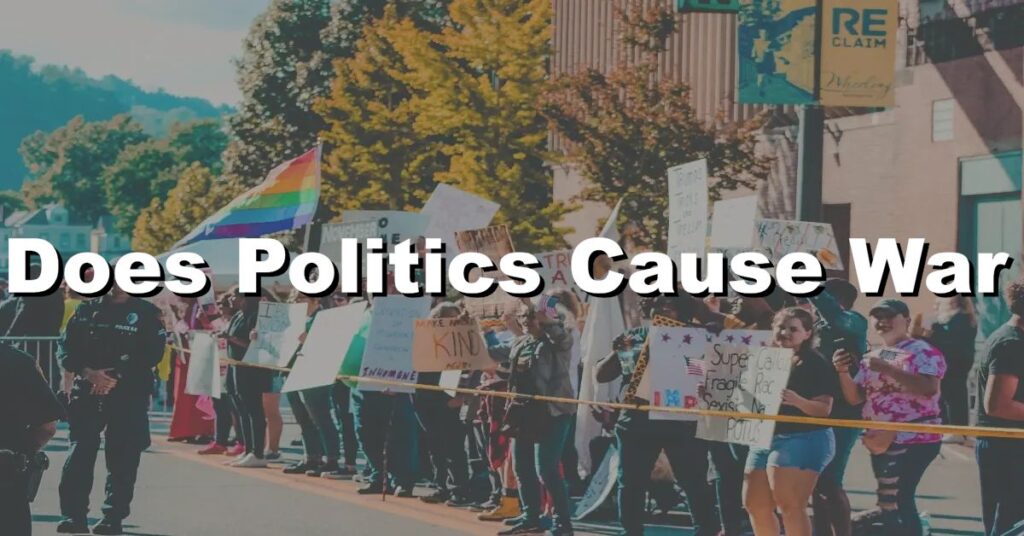The relationship between politics and war is a complex and controversial topic. While some argue that war is an inevitable result of political conflict, others believe that diplomacy and other non-violent methods can be used to resolve disputes.
In this blog post, we will examine the relationship between politics and war and explore whether political conflict is a driving force behind armed conflict.
The Relationship Between Political Rhetoric and Conflict
Political rhetoric plays a significant role in shaping and fueling conflicts. The language used by political leaders and influencers can be instrumental in mobilizing support, creating divisions, and exacerbating tensions within societies. When political rhetoric becomes inflammatory, dehumanizing, or fear-inducing, it can contribute to the escalation of conflicts.
Words have the power to influence public opinion, sway emotions, and shape perceptions of the “other.” Therefore, it is crucial for political leaders to exercise responsibility and promote constructive dialogue that seeks to bridge differences and find common ground.
By employing respectful and inclusive rhetoric, political actors can foster understanding, de-escalate conflicts, and promote peaceful resolutions.
The Role of Nationalism in Driving Political Conflict
Nationalism, while often seen as a unifying force, can also contribute to political conflicts. It entails a strong sense of loyalty and devotion to one’s nation, often accompanied by the belief in its superiority over others. When nationalism becomes extreme or exclusionary, it can lead to conflicts rooted in the pursuit of dominance, territorial disputes, or ethnic tensions.
The desire to protect and promote national interests can sometimes clash with the interests of other nations, resulting in political conflicts. While nationalism can foster a sense of identity and solidarity within a nation, it is essential to balance it with respect for diversity, cooperation, and the recognition of shared humanity to prevent conflicts driven by divisive nationalism.
The Impact of Political Polarization on International Relations
Political polarization, characterized by deep divisions and ideological differences, can have a significant impact on international relations. When political parties or factions within a country are deeply polarized, it can hinder cooperation and consensus-building with other nations.
Polarization often leads to an “us versus them” mentality, where negotiations and diplomacy become challenging. Political actors may prioritize partisan interests over diplomatic engagement, making it difficult to find common ground and resolve international disputes. The ripple effects of internal polarization can also extend beyond borders, affecting alliances, trade agreements, and global stability.
Overcoming political polarization is crucial for fostering healthy international relations, promoting cooperation, and addressing pressing global challenges effectively.
The Use of Military Force as a Political Tool
The use of military force as a political tool has significant consequences and is often a last resort in resolving conflicts. Military interventions, whether in the form of wars, interventions, or peacekeeping missions, shape the political landscape and have far-reaching implications.
The decision to employ military force carries immense responsibility, as it can result in loss of life, destruction, and long-lasting consequences for the countries involved. Political leaders must carefully consider the justifications for military action, weigh the potential costs and benefits, and explore alternative peaceful avenues before resorting to force.
International law and ethical considerations play a crucial role in guiding the use of military force, emphasizing the need for proportionality, respect for human rights, and a commitment to resolving conflicts peacefully whenever possible.
The Potential for Diplomacy to Resolve Political Conflicts
Diplomacy offers an alternative to the use of force in resolving political conflicts. It involves negotiations, dialogue, and the pursuit of peaceful solutions through diplomatic channels. Diplomacy allows nations to address differences, find common ground, and work towards mutually beneficial outcomes.
Effective diplomacy requires skilled diplomats, open lines of communication, and a commitment to dialogue and compromise. By engaging in diplomacy, political actors can prevent conflicts from escalating, reduce tensions, and build relationships based on mutual respect and understanding.
While diplomacy may be challenging and time-consuming, its potential for resolving conflicts and fostering peaceful coexistence is immense. Diplomatic efforts, backed by international cooperation and respect for international law, offer hope for resolving political conflicts in a way that upholds human rights, stability, and global peace.
Conclusion
In conclusion, politics can certainly be a contributing factor to war, but it is not the only factor. Other factors such as economics, ideology, and territorial disputes can also play a role in the outbreak of armed conflicts.

